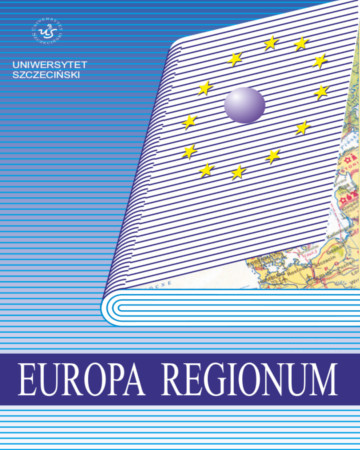
ISSN: 1428-278X
eISSN: 2717-437X
OAI
DOI: 10.18276/er.2018.37-04


Issue archive /
t. 37 2018
Źródła finansowania start-upów w Niemczech
(Sources of startup financing in Germany)
| Authors: |
Łukasz
Niklewicz
Uniwersytet Szczeciński |
| Keywords: | sturtups sources of financing problems with access to finance capital |
| Data publikacji całości: | 2018-12-31 |
| Page range: | 12 (53-64) |
| Klasyfikacja JEL: | M13 D22 L26 |
Abstract
The article defines startup as a young, innovative enterprise operating on markets with high growth prospects. In order to cope with maintaining the market and growth, new companies depend on adequate financing. The appropriate financing instruments and individual groups of investors are discussed in more detail in the theoretical part of this study. Demand for financial capital in which a startup operates is strongly related to the life cycle, the size of the enterprise and its headquarters. The aim of the considerations taken in this article was to analyze the problems and causes related to the financing of startups. In addition, there were presented relationships between individual phases of a company’s life and available sources of financing. The observations made can be a valuable contribution to the discussion on effective startup funding instruments and current restrictions and difficulties in quick capital acquisition. The sources of empirical data were reports and articles on the financing of startups in Germany.
Download file
Article file
Bibliography
| 1. | Al-Kaber, M. (2006). Rynki finansowe i instytucje. Białystok: WSE. |
| 2. | Białek-Graczyk, M. (2016). Kulturalny start-up od pomysłu do realizacji. Podpowiedzi dla inkuabtorów. Pobrane z: http://e.org.pl/wp-content/uploads/2016/02/kulturalnystartup. pdf (28.11.2018). |
| 3. | Brzozowska, K. (2008). Business Angels na rynku kapitałowym. Motywacje, inwestowanie, efekty. Warszawa: CeDeWu. |
| 4. | Denis, D.J. (2004). Entrepreneurial Finance: An Overview of the Issues and Evidence. Journal of Corporate Finance, 10 (2), 301–326. |
| 5. | DMS (2018). Deutscher Startup Monitor. Pobrane z: https://deutscherstartupmonitor. de/ fileadmin/dsm/dsm-18/files/Deutscher%20Startup%20Monitor%202018.pdf (21.11.2018). |
| 6. | Głodek, P., Pietras, P. (2011). Źródła finansowania dla komercjalizacji technologii i wiedzy. Warszawa: Polska Agencja Rozwoju Przedsiębiorczości. |
| 7. | Grummer, J.M., Brohilker, J. (2012). Phasengerechte Finanzierung – Teil 1, Teil 2, Teil 3. Pobrane z: https://www.gruenderszene.de/allgemein/phasengerechte-finanzierung-gruendungsphasen (26.11.2018). |
| 8. | https://www.bitkom.org/Presse/Presseinformation/Startups-brauchen-deutlich-mehr-Geld. html (4.01.2019). |
| 9. | https://www.exist.de/DE/Programm/Exist-Gruenderstipendium/inhalt.html (4.01.2019). |
| 10. | https://www.ey.com/Publication/vwLUAssets/ey-deutsche-boerse-studie-startup-oekosysteme/$ FILE/ey-deutsche-boerse-studie-startup-oekosysteme.pdf (4.01.2019). |
| 11. | https://www.hiig.de/wp-content/uploads/2017/06/2017-06-15-startup-ecosystems-v1.0.pdf (4.01.2019). |
| 12. | https://www.pwc.de/de/startups/pwc-studie-startups-in-deutschland-2018.pdf (4.01.2019). |
| 13. | Jurewicz, A. (2015). To nie czary, lecz metoda. Pobrane z: businessman.pl (26.11.2018). |
| 14. | Kasperzak, R. (2001). Unternehmenskauf durch Management Buy Out/Management Buy In. W: L. Koch, Ch. Zacharias (red.), Gründungsmanagement (s. 151–162). München. |
| 15. | Kollmann, T. (2014). E-Entrepreneurship – Grundlagen der Unternehmensgründung in der Net Economy. 5. Auflage. Wiesbaden. |
| 16. | Kollmann, T. (2016). E-Entrepreneurship – Grundlagen der Unternehmensgründung in der Net Economy. 6. Auflage. Wiesbaden. |
| 17. | Kornasiewicz, A. (2004). Venture capital w krajach rozwiniętych i w Polsce. Warszawa: CeDeWu. |
| 18. | Kuryłek, Z. (2013). Finansowanie pomostowe w wykupach lewarowanych. Zeszyty Naukowe Uniwersytetu Szczecińskiego, 760, 667–677. |
| 19. | Łopusiewicz, A. (2013). Start-up od pomysłu do sukcesu. Warszawa: Samo Sedno. |
| 20. | Mikołajczyk, B., Baran-Szablewska, E. (2010). Mikrofinansowanie w początkowej fazie działalności MSP w Niemczech. Poznań: Wydawnictwo Uniwersytetu Ekonomicznego w Poznaniu. |
| 21. | Paschen, J. (2017), Choose Wisely: Crowdfunding Through the Stages of the Startup Life Cycle. Business Horizons, 60 (2), 179–188. |
| 22. | Pluskota, P. (2008). Tendencje innowacyjnego rozwoju polskich przedsiębiorstw. Warszawa: Instytut Wiedzy i Innowacji. |
| 23. | Ripsas, S., Tröger, S. (2014). Deutscher Startup Monitor 2014. Berlin: KPMG in Deutschland. Schnedler, J. (2017). Startup-Recht. Praktischer Leitfaden für Gründung, Unternehmensführung und –finanzierung. Köln: O‘Reilly. |
| 24. | Seikel, T. (2018). Pobrane z: https://startupspot.de/startup-buzzword-1x1-tobias-erklaert- -das-wort-company-builder/ (21.11.2018). |
| 25. | Volkmann, C.K., Tokarski, K.O., Grünhagen, M. (2010). Entrepreneurship in a European Perspective. 1. Auflage. Wiesbaden: Springer Gabler. |
| 26. | Wassermann, N. (2012). The Founder‘s Dilemmas: Anticipating and Avoiding the Pitfalls That Can Sink a Startup. Princeton: Princeton University Press. |